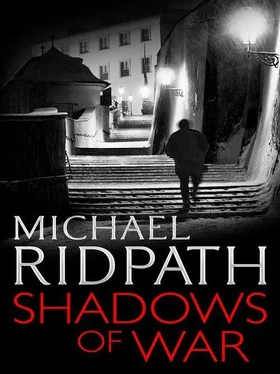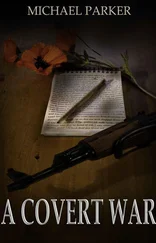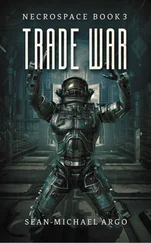Major Liss woke him up.
Liss was an officer in the Foreign Armies West Intelligence Directorate. He was an artilleryman from Mecklenburg, so not one of the aristocratic Prussians from whom many of the general-staff officers were drawn, but he was a prize-winning horseman, and in the Wehrmacht that earned you respect. He was also highly intelligent and spoke English, French, Spanish and Italian.
‘Thank you for coming out here, Hertenberg. And for all the intelligence you have been providing us with over the last few weeks. As you will see, it has been very valuable.’
‘I am very glad to hear that, Herr Major.’
Theo had never met Liss before. He had passed on the information Bedaux had been giving him to Colonel Oster, who then passed it to people at Armies West Intelligence to analyse. People like Major Liss.
‘Now, what I am going to tell you, what I am going to show you, is highly confidential,’ Liss said. ‘Colonel Oster has vouched for you. I have something for you to ask your contact. To ask it properly, and to understand the answer, you need to understand the question.’
‘Yes, Herr Major.’
‘Come with me.’
Theo followed Liss through the warren. The tunnels were lined with concrete to protect them from Allied bombs, and telephone and electricity cables ran along the ceiling. They came to a large room in the middle of which was a table with a relief map of northern France, Belgium, Luxembourg and Germany.
‘We call this “the cowhide”,’ said Liss. ‘As you can see, we have marked the deployment of the French and British Armies, much of it with information given to us by you.’
Theo looked at the map. Liss pointed out the French fortifications on the Maginot Line, then the French 2 ndArmy along the Meuse around Sedan, then the other French armies lined up along the Belgian border, and finally the British Expeditionary Force at the Channel coast near Calais and Dunkirk.
‘You are familiar with Case Yellow?’ Liss said.
‘Of course,’ said Theo. ‘It’s the plan for an offensive in the west. But I don’t know the current details. I assume it involves invading through Belgium and Holland.’
‘It does. Last week we played a war game in this room, trying out Case Yellow. I played the part of General Gamelin, the French commander-in-chief.’
‘What happened?’
‘You see these two armies here?’ Liss pointed to two concentrations of units on the German border with Holland, Belgium and Luxembourg. The northern one, Army Group B, was much larger than the southern one, Army Group A.
‘Yes.’
‘All right. Army Group B thrusts through the flat country of Holland and Belgium, through Brussels and on into Flanders. The idea is to break through around Lille and Amiens and swing south to Paris. Army Group A moves west through the Ardennes forest to the Meuse near Sedan, and pins down the French armies there, protecting Army Group B’s flank.’
‘I see,’ said Theo. ‘And you say you fought this battle last week?’
‘We did,’ said Liss.
‘I have to ask the question,’ said Theo. ‘Who won?’
‘Army Group B broke through the Belgian army’s forward defences along the Albert Canal, and took Brussels. But then the French 7 thArmy moved north into Belgium, and met our forces here.’ Liss pointed to a gap between the River Dyle and the River Meuse near Namur. ‘As you have pointed out, the 7 thArmy is France’s strongest. So this is where the key battle is. Their tanks against our tanks.’
‘And we win?’
‘Not necessarily. They have as many tanks as we do. And their SOMUA S35 is as powerful as our Panzer Mark III. Coming up behind the 7 thArmy is the BEF. We get bogged down. We all get bogged down. It’s 1914 all over again. Or 1915.’
‘Oh,’ said Theo.
‘Yes. Of course there is some disagreement among the general staff as to what will happen. I think it’s fair to say that the Führer is more optimistic than General Halder.’
‘And your view?’ Theo asked.
‘My view is we get bogged down.’
A return to the trench fighting of the last war was every German soldier’s nightmare. Probably every French soldier’s as well. ‘I thought our tanks would avoid that,’ said Theo. ‘A blitzkrieg, like Poland.’
‘The French have more tanks than the Poles, a lot more. And they are better tanks.’
Theo examined the map. The little markers, each one a division, represented thousands of men soon to be propelled headlong at each other in Flanders. ‘So what is your request?’
‘I told you I played the role of General Gamelin?’
‘Yes.’
‘It’s a difficult task,’ Liss said. ‘The difficulty isn’t working out what the French should do, but rather what they will do.’
‘Shouldn’t you just assume they pursue the best strategy?’ Theo asked.
‘No.’
‘Why not?’
‘Because that’s not what the French do.’ Liss smiled. ‘When we invaded Poland we left only thirty-five divisions of reservists along our western border. The French had seventy-five divisions facing us and three thousand two hundred tanks. We had none. Not one. If the French had ordered an immediate armoured offensive, they would have smashed through the Siegfried Line within a fortnight. We would have lost the war.’
It sounded extraordinary, but Theo believed Liss. He knew the results of a similar war game held in 1938, just before the impending invasion of Czechoslovakia. The Czechs held up the German army long enough for the French armour to roll through the Rhineland. Germany lost the war within months. That was why General Beck and the others had been so desperate to topple Hitler back then.
‘So why didn’t the French generals just do that in September?’
‘It would never have entered their heads. More importantly, it would never enter the heads of the French politicians. Or the British. They have their Maginot Line, and their plans are to sit there and wait for us to attack them. I don’t think they realize even now how they could have won the war.’
‘All right,’ said Theo.
‘So what I need to know’, said Liss, ‘is what the French plan to do if and when we invade Belgium. We can see from their dispositions it’s clearly something they are expecting. In particular, what will the 7 thArmy do? That’s what I want you to find out. Then, next time we play this war game I can play Gamelin’s role more accurately. Can you do that?’
‘I can try,’ said Theo.
‘Thank you, Hertenberg,’ said Liss.
Theo was about to leave, when he paused. ‘What about here?’ he said, pointing to the French border with Belgium along the Meuse. ‘The information I received was that the 2 ndArmy guarding this section is very weak.’
Liss smiled. ‘Yes. Of course the hills and forests of the Ardennes would slow up any armoured assault. But that is something we discussed. The Führer was particularly intrigued.’
Despite himself, Theo couldn’t help feeling a surge of pride that the Führer himself was interested in the information he had provided.
As he drove back to Berlin, Theo marvelled at his own inconsistency. On the one hand he prayed for Hitler to be removed. He dreaded a German victory over France and Britain, almost as much as the stalemate that Liss was predicting. On the other, he was helping Liss and the general staff craft a strategy that would smash the Allied armies. Both attitudes made sense. It was his bounden duty as an army officer to do all he could to help his country win a battle. It was also his duty as a good German and patriot to stop an evil madman destroying his country.
But those two conceptions of his duty were contradictory. And Theo wasn’t sure how long he could deny that contradiction.
Читать дальше












